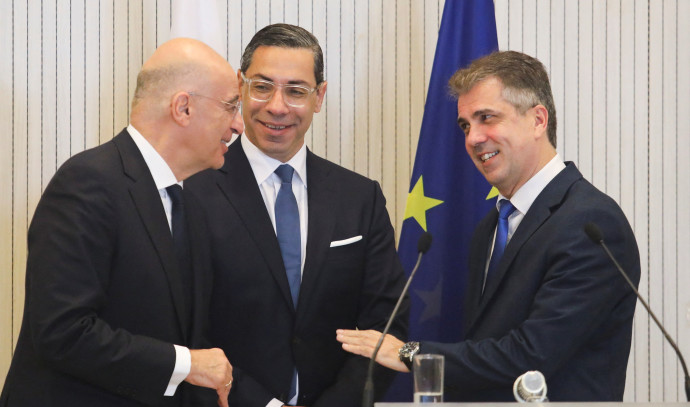The recent travel itinerary of senior Israeli officials highlights the shifting sands of Israeli diplomacy and how the country’s network of global relations has grown significantly over the past two decades.
On Sunday, Minister of Transport, Miri Regev and three other senior officials from his ministry began a week-long trip to Morocco.
Foreign Minister Eli Cohen held meetings in Croatia on Monday at the start of a visit to four Central European countries. And on Tuesday, President Isaac Herzog to visit Azerbaijan for the first ever Israeli presidential visit.
If 20 years ago the main destination of Israeli ministers and its president was America and Western Europe, today they travel just as frequently to the capitals of Asia, the Middle East and from Eastern Europe.
For example, Cohen is expected to visit the Philippines in early June, making him the first Israeli foreign minister to visit that country in 60 years. Most of the 15 countries he visited during his first five months in office were outside Western Europe.
Regev’s visit to Morocco did not cause much fanfare. However, the press questioned whether she should spend a week in the North African country while her official business there would only take two days.
However, the fact that this is the most attention-grabbing part of his visit, and not an Israeli minister traveling to Morocco and signing several transport deals with a key Arab state, shows the extent to which things have changed and how these types of visits – which just five years ago would have made headlines – are now commonplace.
Herzog’s trip to Azerbaijan is another example. Although his visit will surely make headlines in Israel more than Regev’s trip to Morocco, as it is the first-ever visit by an Israeli president to Azerbaijan, a Shiite state bordering Iran, here too , it will not receive the same press. as he would have received it 10 years ago.
Why not? Because in the meantime, there have been numerous ministerial visits, including a brief visit to Azerbaijan in 2016 by Prime Minister Benjamin Netanyahu. Meanwhile, Azerbaijan opened an embassy in Israel. And in the meantime, Israel’s strategic ties with that country – including Israeli arms sales to Baku and Azerbaijan’s oil sales to Israel – have become well known and well documented.
Call it the banality of Israel’s ties to the Islamic world.
Ties with Muslim countries are no longer special
These connections have become mundane and ho-hum because they have become routine. These tours don’t generate as much buzz as one might expect – in April, Cohen went to Turkmenistananother Islamic state bordering Iran, with great fanfare – because they have become regular.
The very regularity of these visits, including presidential and ministerial visits to the United Arab Emirates and Bahrain, is in fact what deserves attention and shows how Israel is gradually being seen as an indispensable element in the region.
Israel has had formal relations with Azerbaijan for years and informal relations with Morocco long before the signing of the Abraham Accords. So why are these visits important?
They are important because while in the past these relationships were deliberately kept out of the spotlight, well out of sight of those who might take umbrage, they are now on display for all to see. And this difference is significant.
If there are few high-level visits or meetings, if the relationship is deliberately conducted under the radar, then the projected message is that there is something wrong, even illicit, about these ties. Countries – like citizens – only keep their meetings private if they are embarrassed to be seen in public with the other party.
This is one of the reasons why Azerbaijan only recently opened an embassy in Tel Aviv, even though Israel has had one in Baku since 1993: Baku did not want to draw too much attention to this relationship because it would pose problems for Azerbaijan in its efforts. to acquire a leadership role in the Islamic world.
This has now changed. Herzog’s visit – by its very nature – is highly publicized. Azerbaijan does not seek to hide its ties with Israel but is now willing to highlight them.
Eastern Europe is an important part of the EU
Cohen’s visit to Croatia also shows the extent to which Israel’s foreign policy has changed direction. While Cohen met EU foreign policy chief Josep Borrell in Brussels last month, the visit to Croatia, and from there to Hungary, Slovakia and Austria, is a signal that Israel understands that the EU is much more than just Western Europe.
“Strengthening ties with Israel’s friends in the EU is an important step in promoting Israel’s interests,” Cohen said in Zagreb.
This is a continuation of a policy that Netanyahu put into practice before being removed from office in 2021: developing ties – sub-alliances – with EU countries to counterbalance anti-government sentiment. Israeli of its bureaucracy in Brussels and some of its members. other member countries, such as Ireland, Belgium, Luxembourg, Spain and Portugal.
This meant moving closer to some of Europe’s illiberal democracies, such as Hungary and – until Holocaust issues deepened ties – Poland.
When Yair Lapid became foreign minister in 2021, he attempted to recalibrate Isarel’s ties with the EU, downplaying relations with the 11 Central and Eastern European countries that have joined the EU since 2004 and to focus more on improving ties with the European bureaucracy in Brussels and the Western European country.
Cohen’s current trip to Croatia and Central Europe is a sign that Israel is once again trying to forge close relationships with sub-alliances within the EU, more understanding of its concerns and which can then have some influence on the EU’s overall positions in the Middle East.


